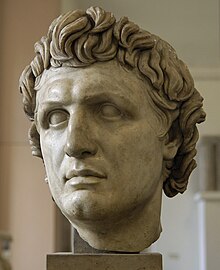
Back أتالوس الأول Arabic Атал I Сатэр Byelorussian Атал I Bulgarian Àtal I de Pèrgam Catalan Attalos I. Czech Attalos I. German Άτταλος Α΄ της Περγάμου Greek Atalo I Spanish Atalo I.a Basque آتالوس یکم Persian
| Attalus I Soter | |
|---|---|
| Basileus | |
 Marble head found at Pergamon dated to the 3rd century BC, currently at the Pergamon Museum in Berlin; hypothesized to be depicting Attalus I.[1] | |
| King of Pergamon | |
| Reign | 241–197 BC |
| Predecessor | Eumenes I |
| Successor | Eumenes II |
| Born | 269 BC |
| Died | 197 BC (aged 72) |
| Spouse | Apollonis of Cyzicus |
| Issue |
|
| Greek | Άτταλος Α΄ Σωτήρ |
| Dynasty | Attalid dynasty |
| Father | Attalus |
| Mother | Antiochis |
Attalus I (Ancient Greek: Ἄτταλος 'Attalos'), surnamed Soter (Greek: Σωτήρ, 'Savior'; 269–197 BC),[2] was the ruler of the Ionian Greek polis of Pergamon (modern-day Bergama, Turkey) and the larger Pergamene Kingdom from 241 BC to 197 BC. He was the adopted son of King Eumenes I, whom he succeeded, and was the first of the Attalid dynasty to assume the title of king, sometime around 240 to 235 BC. He was the son of Attalus and his wife Antiochis.
Attalus won an important victory, the Battle of the Caecus River, over the Galatians, a group of migratory Celtic tribes from Thrace, who had been plundering and exacting tribute throughout most of Asia Minor for more than a generation. The victory was celebrated with a triumphal monument at Pergamon (The Dying Gaul) and Attalus taking the surname "Soter" and the title of king. He participated in the first and second Macedonian Wars against Philip V of Macedon as a loyal ally of the Roman Republic, although Pergamene participation was ultimately rather minor in these wars.[3] He conducted numerous naval operations throughout the Aegean, gained the island of Aegina for Pergamon during the first war and Andros during the second, twice narrowly escaping capture at the hands of Philip V. During his reign, Pergamon also repeatedly struggled with the neighboring Seleucid Empire to the east, resulting in both successes and setbacks.
Attalus styled himself as a protector of the freedoms of the Greek cities of Anatolia as well as the champion of Greeks against barbarians. He funded art and monuments in Pergamon and in Greek cities he sought to cultivate as allies. He died in 197 BC at the age of 72, shortly before the end of the second war, having suffered an apparent stroke while addressing a Boeotian war council some months before. He and his wife Apollonis were admired for their rearing of their four sons. He was succeeded as king by his son Eumenes II.
- ^ Green, p. 264.
- ^ Hansen, p. 26. Livy, 33.21–22, says that Attalus died in the consulship of Cornelius and Minucius (197 BC) at the age of 72, having reigned 44 years. Polybius, 18.41, also says that he died at 72 and reigned 44 years. Strabo, 13.4.2, says that he reigned 43 years.
- ^ Hansen, pp. 46–50; Kosmetatou, p. 163; Gruen 1990, p. 29.
© MMXXIII Rich X Search. We shall prevail. All rights reserved. Rich X Search